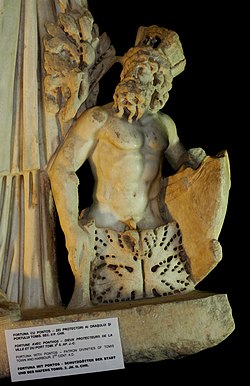Pontus (mythology)
In Greek mythology, Pontus (/ˈpɒntəs/; Ancient Greek: Πόντος, romanized: Póntos, lit. 'Sea')[1] was an ancient, pre-Olympian sea-god, one of the Greek primordial deities. Pontus was Gaia's son and has no father; according to the Greek poet Hesiod, he was born without coupling,[2] though according to Hyginus, Pontus is the son of Aether and Gaia.[3] MythologyFor Hesiod, Pontus seems little more than a personification of the sea, ho póntos (Ancient Greek: ὁ Πόντος), by which Hellenes signified the Mediterranean Sea.[4] After the castration of his brother Uranus, Pontus, with his mother Gaia, fathered Nereus (the Old Man of the Sea), Thaumas (the awe-striking "wonder" of the Sea, embodiment of the sea's dangerous aspects), Phorcys and his sister-consort Ceto, and the "Strong Goddess" Eurybia.[5] With the sea goddess Thalassa (whose own name simply means "sea" but is derived from a Pre-Greek root), he fathered all sea life.[2][6][7][8] In a Roman sculpture of the 2nd century AD, Pontus, rising from seaweed, grasps a rudder with his right hand and leans on the prow of a ship. He wears a mural crown, and accompanies Fortuna, whose draperies appear at the left, as twin patron deities of the Black Sea port of Tomis in Moesia. Sources Hesiod
— Hesiod, Theogony (231–239)[2] Hyginus
See alsoNotes
References
|
|||||||||||||||||||||||














